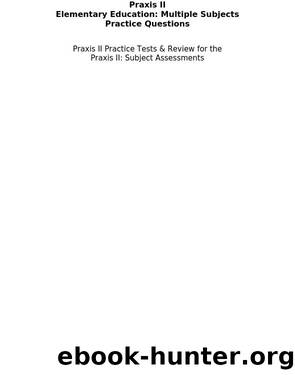Praxis II Elementary Education: Multiple Subjects Practice Questions by Praxis II Exam Secrets Test Prep Staff

Author:Praxis II Exam Secrets Test Prep Staff
Language: eng
Format: epub
Publisher: Mometrix Media LLC
75. A: Students are completely capable of understanding and appreciating oral traditions and written texts from other world cultures, as well as those originating from cultures in the studentsâ own community. In fact, introducing a variety of material can increase some studentsâ appreciation of language and literature as it enables them to learn about the world around them. Language skills emerge at a point in most childrenâs development during which students are fascinated with learning new concepts. Introducing a variety of texts also benefits students in a classroom who belong to other cultures; these students are able to learn concepts from texts that represent their family, culture, or country of origin.
76. C: In Choice âaâ, the words prince and princess are capitalized, though they do not have suffixes. In choice âbâ, the word âmultimediaâ contains the prefix âmultiâ, but no suffix. Choice âcâ contains a word with the root âplease,â which also has both a prefix and a suffix. The â-ingâ acts as the suffix in displeasing, therefore it is correctly capitalized.
77. A: Most adults can understand the relationship between oral and written language: components of oral language have representational symbols that can be written and decoded. However, most normally developing children acquire spoken language first and begin to develop reading and writing skills as they approach school-age. Many children are first exposed to the concept of written language when an adult introduces books or other written texts. However, a childâs ability to read and write develops over time and is dependent on the development of physiological processes such as hearing, sight, and fine motor skills for writing. Written language development also typically requires direct instruction. Most children must be taught to read and write and rarely learn these skills simply by observing others.
78. D: Reading instructors should teach students to activate their prior knowledge because it will improve their reading comprehension. Before reading (choice A), teachers should discuss and model connections with existing knowledge to prepare students by helping them consider what they already know about the subject of the text. While they read (option B), students can make better sense of the text by considering how it fits with what they already know. After reading (choice C), teachers can lead discussions helping students focus on how the connections they made between the text and their previous knowledge informed their understanding of the text, and on how the text helped them build their foundations of existing knowledge.
79. D: Classrooms will most always consist of students at different levels of ability. The physical and psychological processes needed for reading evolve simultaneously over time and do so at different rates for each individual. No two students will match up perfectly with respect to language skills. Language skills also incorporate a variety of other processes, including speaking, listening, thinking, viewing, writing, and reading. By pairing direct instruction with various types of cognitive processes, all students receive varied instruction and will make progress. By being introduced to different types of text, students will develop skills according to their own strengths at that particular time.
Download
This site does not store any files on its server. We only index and link to content provided by other sites. Please contact the content providers to delete copyright contents if any and email us, we'll remove relevant links or contents immediately.
1,001 ASVAB Practice Questions For Dummies by Powers Rod(4071)
ASVAB For Dummies by Powers Rod(2476)
Police Exams Prep 2018-2019 by Kaplan Test Prep(2059)
Churchill by Paul Johnson(2034)
Wonder by R J Palacio(1634)
Wiley CPA Examination Review Focus Notes by Kevin Stevens(1630)
First Aid Handbook--Crucial Survival Skills, Emergency Procedures & Lifesaving Medical Information by Department of the Army(1522)
1936941139 (N) by Bob Rosenthal(1520)
A Very Stable Genius by Philip Rucker & Carol Leonnig(1354)
ASVAB AFQT For Dummies by Rod Powers(1334)
1,001 ASVAB AFQT Practice Questions For Dummies by Angie Papple Johnston(1195)
U.S. Army Combat Pistol Training Handbook by Army(1170)
CISSP For Dummies by Miller Gregory Peter(1154)
The GED Crash Course by Alpha(1128)
Court Officer Exam by Learning Express LLC(1080)
McGraw-Hill Education 2,000 Review Questions for the CPA Exam by Denise M. Stefano(1079)
Master the Civil Service Exams by Peterson's(1075)
Master the ASVAB by Scott Ostrow(1066)
Future Design by Unknown(1041)
